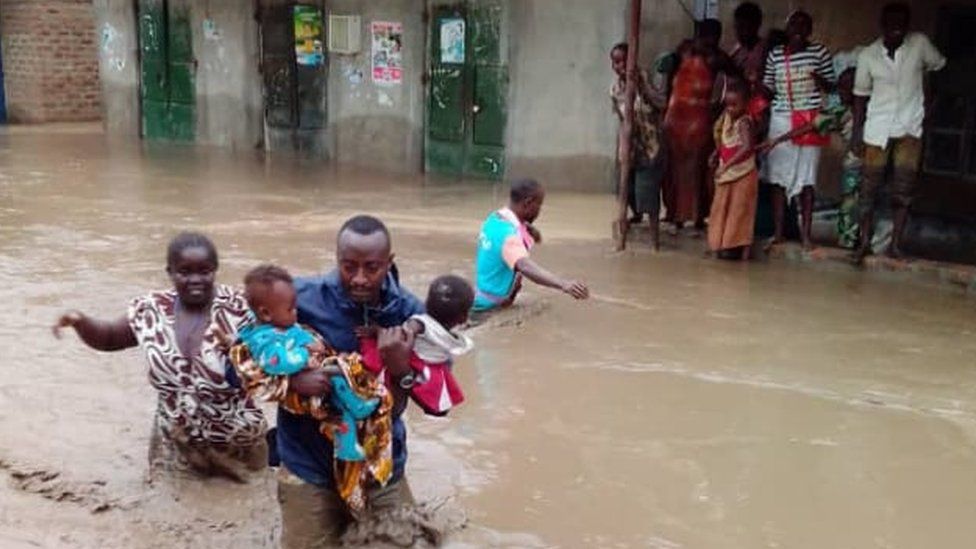Uganda floods: At least 16 people dead, Red Cross says
- Published

Flooding in Uganda has claimed at least 16 lives, the Red Cross says, as the region reels from weeks of rain.
Rescuers have been recovering the bodies of victims swept to their deaths by the flash floods in the western Bundibugyo area, the aid group said.
Homes have been washed away and a number of roads blocked or destroyed.
Large parts of east Africa have suffered floods and landslides in recent weeks. Hundreds have died and millions have been displaced.
The events have been linked to an unusual weather phenomenon in the Indian Ocean,
Meanwhile, in Somalia, the authorities are trying to assess the damage caused by tropical storm Pawan, which brought wind and torrential rain to part of the northern coast on Saturday, cutting communications with the town of Eyl.
What happened in Uganda?
Heavy rain has been battering the country for weeks, and intensified overnight on Friday into Saturday.
Police, military, aid agencies and community members are assisting with search and rescue operations in more than a dozen affected areas.
Rain is hampering communications in the locations in the remote west of the country, AFP news agency reported.
The Red Cross said its volunteers continued to recover more bodies, including some trapped in cocoa trees in the Bundibugyo hills, describing the events as "devastating".
Allow Twitter content?
This article contains content provided by Twitter. We ask for your permission before anything is loaded, as they may be using cookies and other technologies. You may want to read Twitter’s cookie policy, external and privacy policy, external before accepting. To view this content choose ‘accept and continue’.
Last week landslides caused by heavy rain claimed a number of lives in the east of the country.
Uganda's disaster management agency has advised people not to walk, ride or drive across any flooded roads or bridges, and to keep away from river banks and steep slopes.
How about Somalia?
Somalia's north-eastern Puntland state had been bracing for Cyclone Pawan, which was downgraded to a storm before it made landfall in an area already suffering the impact of recent high winds and flooding.
At least one person is reported to have died after a fishing boat capsized, while in the Eyl area, a child was reported to have died from exposure after houses and livestock were washed away.
BBC Africa correspondent Ann Soy says it appears most people had fled or been evacuated from Eyl, a small coastal city, but buildings were destroyed and communications infrastructure was damaged.
Some roads in Puntland have been destroyed making transport difficult. Flights into and out of Gorowe were suspended all of Saturday, but they have now resumed.
There are numerous reports of loss of livestock to floods in villages, something that threatens the livelihoods of local communities, our correspondent adds.
See the impact of East Africa's deadly floods, as warnings were sounded ahead of the weekend's rain
What's been the wider impact of heavy rains?
Heavy downpours have devastated parts of East Africa over the last two months, with the Horn of Africa seeing up to 300% above average rainfall between October and mid-November, according to the Famine Early Warning Systems Network.
Djibouti, Ethiopia, Kenya, Uganda, Tanzania, Somalia and South Sudan have been particularly badly affected, with flash floods and landslides hitting communities across the region.
Almost 300 people have reportedly died and 2.8 million people have been affected, according to the UN Office for the Coordination of Humanitarian Affairs.